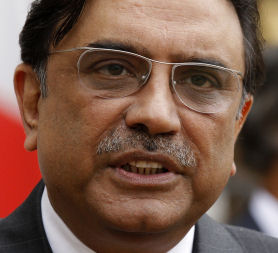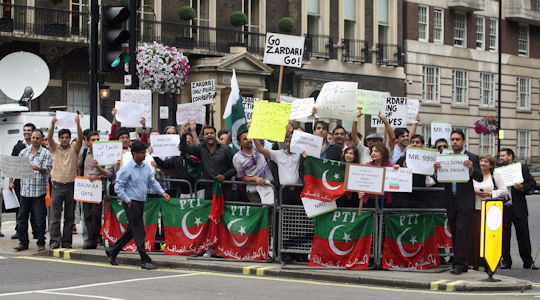Cameron meets Zardari amid Pakistan 'terror' row
Updated on 05 August 2010
David Cameron meets Pakistani President Asif Ali Zardari tonight a week after the prime minister's warning that Pakistan cannot "look both ways" on terror. Security expert Professor Shaun Gregory writes for Channel 4 News on how relations between the two countries could be due a rethink.

Pakistan's President Asif Ali Zardari will meet Prime minister David Cameron tonight at Chequers as part of his five-day visit to the UK.
Last week Cameron accused Pakistan of looking both ways on terror during a speech in India. President Zardari on Tuesday responded with some "frank talking" of his own, suggesting that NATO forces were losing the war against the Taliban.
Speaking to Le Monde newspaper, he said: "The international community, to which Pakistan belongs, is in the process of losing the war against the Taliban. This is above all because we have lost the battle to win hearts and minds."
The pair are due to meet at an informal dinner at Chequers as part of President Zardari's visit to the UK.
Channel 4 News foreign affairs correspondent Jonathan Rugman said the visit has been low key.
"You can argue that we need Pakistan more than Pakistan needs us," he said.
"It is interesting there is no press conference scheduled tomorrow. Interestingly President Zardari has spoken to Gordon brown and David Miliband which suggests he is more comfortable with the Labour party he knows of old."
Professor Shaun Gregory, director of the Pakistan Security Research Unit at the University of Bradford, writes:
Prime Minister David Cameron has provoked the anger of Pakistan and Pakistanis by publicly stating the awkward truth that Pakistan is doing too little to prevent the export of terrorism from its territory.
In response Pakistan's lead intelligence agency the ISI cancelled a planned visit to the UK, the UK High Commissioner to Pakistan has been called in for a dressing down in Islamabad, and the media and hawkish pundits in Pakistan have severely criticised David Cameron blaming his "gaffe" on inexperience.
Against this backdrop Pakistani President Zardari's five-day visit to Britain, which began on Tuesday and will include an official meetings with Cameron at Chequers, is being widely denounced in Pakistan not least because Zardari – never an understated man – has made lavish arrangements in the UK at precisely the moment more than three million Pakistanis have been devastated by the worst floods in the country’s history.
Protests at President Zardari's arrival in the UK on Tuesday 
No gaffe
David Cameron's remarks were, however, no gaffe. US and UK intelligence has for many years been accumulating evidence that Pakistan is supporting the Afghan Taliban from sanctuaries in Pakistan and that it is from these sanctuaries that the Afghan Taliban has returned as a major force in Afghanistan.
As British casualties continue to rise in this crucial year for NATO/ISAF Pakistan's relationship with the Afghan Taliban has become the central issue which will determine the shape of the transition in Afghanistan and the nature of the post-ISAF settlement.
Intelligence also supports the contention that Pakistan continues to support as a matter of Army policy terrorist organisations like Lashkar-e-Toiba, strongly linked to the Mumbai outrages in November 2008 and many other attacks in India, which serve as de facto irregulars for Pakistan in the uneven struggle with India, not least over Kashmir.
Senior leaders of the LeT and its politico-social avatar Jamat-ud-Dawa, have been regular participants in social events with the Pakistan military in Islamabad and Rawalpindi, and the relationship has not inaccurately been characterised as "a family affair".
Factual statement
Cameron's remarks that Pakistan was looking both ways on terrorism was a statement of fact: Pakistan offers the UK invaluable help with the war against al-Qaida and has suffered more than any NATO member state from the brutal effects of terrorism with more than 10,000 dead and 30,000 seriously injured.
Equally the UK and Pakistan have a shared interest in combating the Pakistani Taliban groups – such as the TTP and TNSM – which threaten the Pakistan state and wish to see it transformed into a radical Islamic state, one which alarmingly would be armed with nuclear weapons which Pakistan first tested in 1998.
UK policy since 2001 has thus been about the calibrated balancing of these interests: maintaining support for Pakistan in the war against al-Qaida and the Pakistani Taliban and supporting de-radicalisation measures in Pakistan through aid on the one hand, whilst maintaining a degree of behind-the-scenes pressure on Pakistan to do more about the Afghan Taliban and to distance itself from the LeT and similar groups on the other.
In very deliberately choosing Delhi to make these tensions public, reinforcing similar views coming out of Washington, David Cameron is undoubtedly seeking to bump the agenda along and provoke a rethink in the UK Foreign Office about the calibration of our security relationship with Pakistan, above all with respect to the Afghan Taliban.
President Zardari will make some tough public pronouncements in the UK in order to appease his domestic audience and seek to shore up his dwindling authority vis-à-vis Pakistan's dominant military and intelligence agencies.
Behind closed doors David Cameron will be well aware that he does not have Pakistan's real power-broker in the room but will want Zardari to take home the strong message that Britain – and the United States - expects more from Pakistan.
 Professor Shaun Gregory is director of the Pakistan Security Research Unit at the University of Bradford.
Professor Shaun Gregory is director of the Pakistan Security Research Unit at the University of Bradford.



